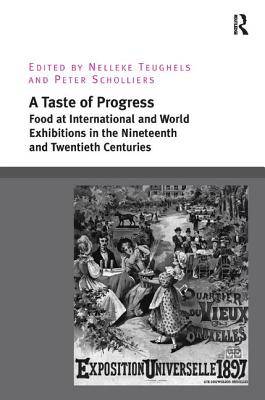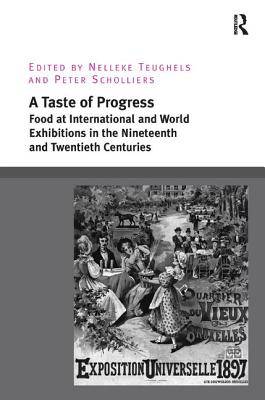
Door een staking bij bpost kan je online bestelling op dit moment iets langer onderweg zijn dan voorzien. Dringend iets nodig? Onze winkels ontvangen jou met open armen!
- Afhalen na 1 uur in een winkel met voorraad
- Gratis thuislevering in België vanaf € 30
- Ruim aanbod met 7 miljoen producten
Door een staking bij bpost kan je online bestelling op dit moment iets langer onderweg zijn dan voorzien. Dringend iets nodig? Onze winkels ontvangen jou met open armen!
- Afhalen na 1 uur in een winkel met voorraad
- Gratis thuislevering in België vanaf € 30
- Ruim aanbod met 7 miljoen producten
Zoeken
A Taste of Progress
Food at International and World Exhibitions in the Nineteenth and Twentieth Centuries
Nelleke Teughels, Peter Scholliers
Hardcover | Engels
€ 274,95
+ 549 punten
Uitvoering
Omschrijving
World exhibitions have been widely acknowledged as important sources for understanding the development of the modern consumer and urbanized society, yet whilst the function and purpose of architecture at these major events has been well-studied, the place of food has received very little attention. Food played a crucial part in the lived experience of the exhibitions: for visitors, who could acquaint themselves with the latest food innovations, exotic cuisines and 'traditional' dishes; for officials attending lavish banquets; for the manufacturers who displayed their new culinary products; and for scientists who met to discuss the latest technologies in food hygiene. Food stood as a powerful semiotic device for communicating and maintaining conceptions of identity, history, traditions and progress, of inclusion and exclusion, making it a valuable tool for researching the construction of national or corporate sentiments. Combining recent developments in food studies and the history of major international exhibitions, this volume provides a refreshing alternative view of these international and intercultural spectacles.
Specificaties
Betrokkenen
- Auteur(s):
- Uitgeverij:
Inhoud
- Aantal bladzijden:
- 348
- Taal:
- Engels
Eigenschappen
- Productcode (EAN):
- 9781472441836
- Verschijningsdatum:
- 28/10/2015
- Uitvoering:
- Hardcover
- Formaat:
- Genaaid
- Afmetingen:
- 156 mm x 234 mm
- Gewicht:
- 666 g

Alleen bij Standaard Boekhandel
+ 549 punten op je klantenkaart van Standaard Boekhandel
Beoordelingen
We publiceren alleen reviews die voldoen aan de voorwaarden voor reviews. Bekijk onze voorwaarden voor reviews.











